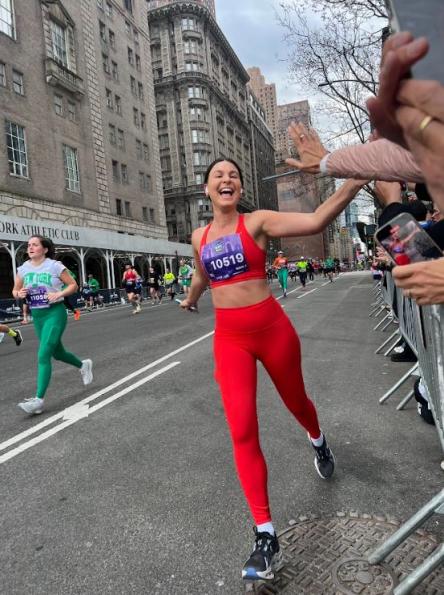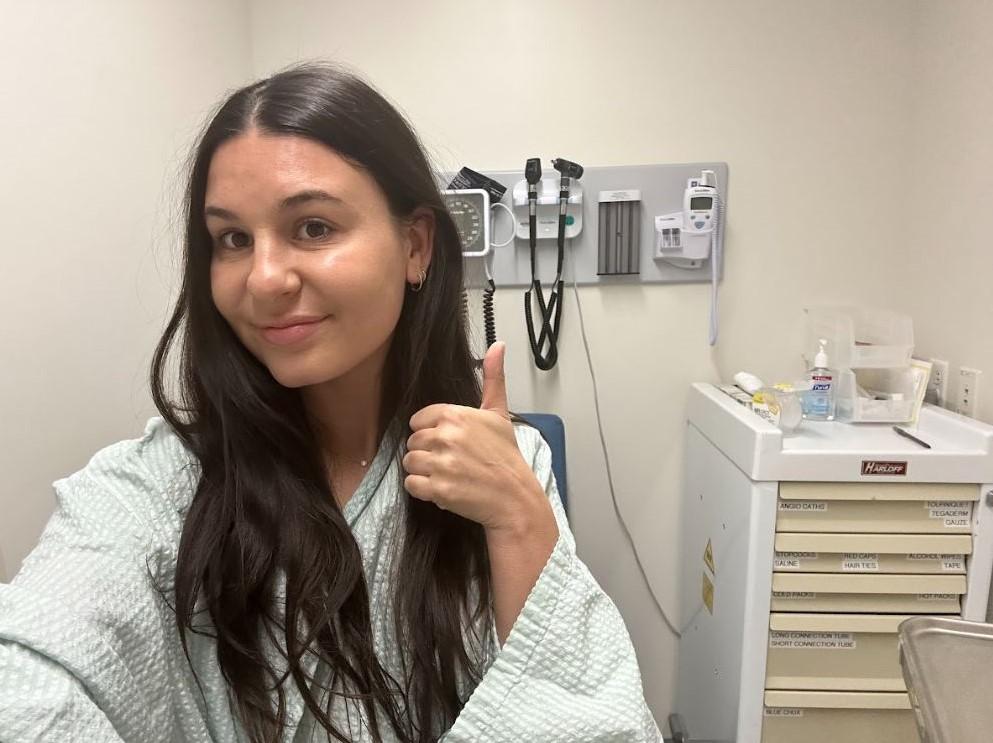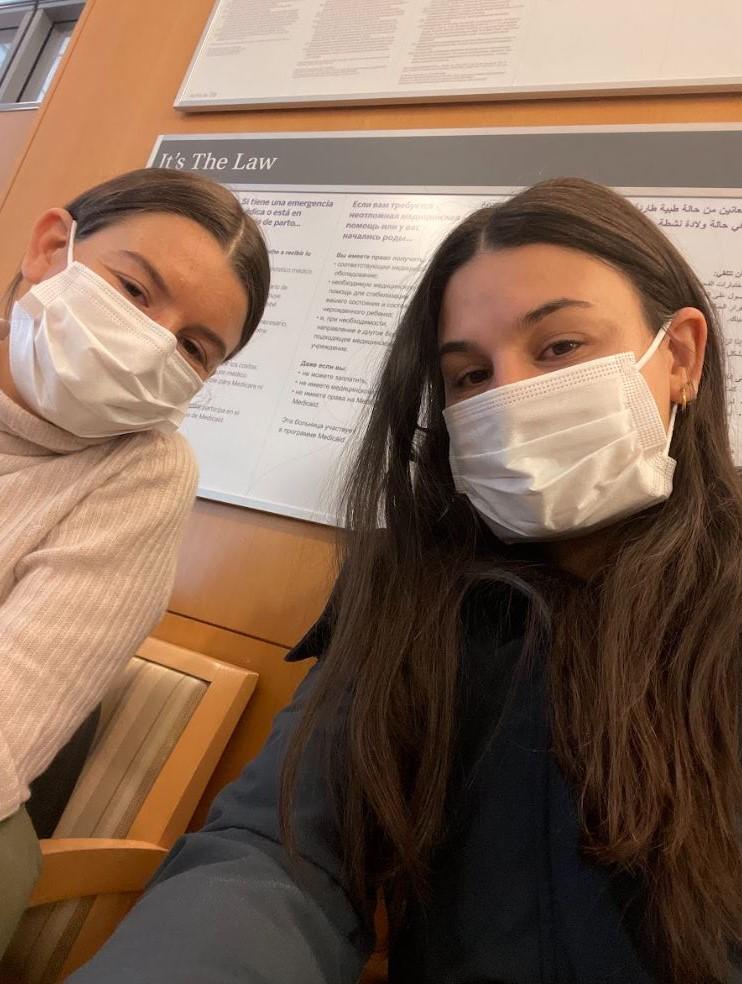
Testing, testing
Summer of 2017. I’ll never forget sitting in the doctor’s office at Northwestern Hospital in Chicago where I was having a family meeting with my mom, dad and brother to discuss testing for the BRCA1 gene with our genetic counselor. Still riding my post-graduation high from the University of Michigan at the end of April, and only a few weeks into my first-ever real job working for the global public relations agency Weber Shandwick at the John Hancock tower just blocks away, at 22 years old I was a fresh fish out of water in work and in life.
At the appointment, my family and I were on one side of the desk and the genetic counselor sat facing us on the other. There she walked us through an endless sea of charts and our family tree (read medical history), while explaining the lifetime risk of different cancers associated with BRCA1 mutations. The data was jarring, especially for women (60-75% chance of developing breast cancer and 30-50% of developing ovarian cancer compared to 13% and 1-2% for those without a high-risk mutation - source).
I understood why I was in this room (my dad discovered he was a carrier after finding out that other relatives on his side of the family carried it too), but that didn’t make digesting any of these facts any easier. Next thing I knew my brother and I were getting our blood drawn to determine if we too carried the genetic mutation. “50/50 chance,” our nurse said. The two of us shook hands and wished each other good luck.
Having historically struggled with facing the reality of test results when it came to my exams, assignments, homework (the perfectionist in me could never mentally bear the reality that not every result would be 100% or an A), this 48-hour waiting game for ours took a toll on me mentally and physically. Tick tock, tick tock.
Back at my office a few days later, the notification in my Northwestern MyChart came in. Unlike the waiting (avoiding) game I would play with myself with Wolverine Access when I would be alerted about results in school, at that moment I knew I needed to rip the Band-Aid and open the letter from our counselor. BRCA1 positive. Not the result I was hoping for.
I soon learned my brother was negative, and I would begin this journey on my own (or so I thought).
Hello, New York!
Summer of 2020. Now 25, living in the city of my dreams and working my dream job at Havas, it was time to officially start my preventative care plan (during the peak of the pandemic might I add).

Lucky for me (I use this phrase lightly), my older female cousins who live in New York were already paving the way for navigating all things BRCA1, giving me a sense of direction now that I finally joined them on this long and winding road.
Interviewing several specialists and setting up all of my appointments took eons; and the administrative work alone to get organized and on their schedules was my first window into the realities of this new thing I had to deal with. But once I had my first scan on the books, I started to feel a sense of control and empowerment. I’m doing all the right things.
While getting my blood drawn once again as I await my first MRI screening (a precursor to mammograms for high-risk patients like myself), I registered that me and needles were going to have to get along nicely, now that this is part of my regularly scheduled programming. In the chair getting my IV for the contrast, I repeated to myself, “information is your superpower.”

Hours later my MRI results were in my MyChart, this time through NYU. Gaining a sense of familiarity with navigating the app, I knew I needed to wait for my doctor to send a follow up message in agreement (or not) with the lab write up that had the raw readings of the scan and a recommendation to come back in one year from the radiologist. And in accordance with the lab, I was told to come back in one year. Phew.
A few weeks later, my parents came to visit in celebration of my first (of hopefully many) clear scans. After a weekend of shopping, walking and eating in true New York fashion, I came home from our last meal together and knew something wasn’t right. I had felt unnaturally tired all weekend and knowing with a BRCA1 mutation the importance of being in tune with your body, rather than toughing it out I voiced my concerns to my roommates at the time. Turns out what I thought was a rash forming above my right eyebrow was in fact shingles.
Having had chickenpox when I was five, I learned that the stress and anxiety of COVID-19 compiled with going through the motions of my first MRI screening, reactivated the virus. My eye was swollen shut for seven straight days. But thanks to my miracle doctors (and doctors to be at the time) for listening to me and quickly confirming my diagnosis and getting me on medication, I was able to rest and recover. Tick tock, tick tock. With time my face returned to nearly as good as new, as did my energy.
It’s time for some fun
Following my shingles saga, after having conversations with friends, family and my preventative care team I was encouraged to go live my life. Literally. I wound up on a plane to Big Sky, Montana with a big group of friends all connected over our love for skiing (might I add, no amateurs were allowed).
Three days into the trip, and the first day on the mountain I heard and felt the dreaded POP. Back in the doctor's office yet again for an X-ray scan, I was informed there was no bone break however it was likely an ACL or meniscus tear.
Unable to climb the stairs to my walkup apartment in the East Village, a week went by and I was back home, and back at Northwestern Hospital, where I eventually learned I had torn both. Tick tock, tick tock.
Brick by brick
A successful surgery and over nine months of physical therapy later, I slowly started to understand the importance of slowing down. I used to wake up at 5:30am to be at the gym by 6 and my desk by 9; moving a million miles per hour in a given day’s time. As I regained my ability to walk, and eventually run, I rid myself of the self-inflicted pressure to be that girl. Brick by brick, step by step I started to build back my strength. Soon my confidence and self-assurance followed.
As you endure different levels of trauma in your life, your perspective on what you can and cannot conquer can change in an instant. Going through my knee recovery process, and still having to stick with my preventative care plan (the MRIs did not stop, nor did the revolving door of doctor appointments) I knew I had no other choice but to give myself the grace, space and patience I knew I needed to take this all on. It feels heavy some days, and lighter on others.
I remember finding out my knee MRI test results (I was now a professional at this point) and getting confirmation on the need for my procedure. To my surprise, feeling completely unphased by this new route (detour) on my long road ahead, I repeated to myself “at least it’s not cancer.”
Life is funny sometimes, and the stars can align just right if you let them. After two years of consistently showing up for myself, in January of 2024 I got the green light to do any activity, and was told by my knee doctor that I never have to come see him again (the good kind of rejection).
Learning to live with it
Summer 2023. We’re finally making our way on the other side of the COVID-19 pandemic (I also use this phrase lightly), and I am granted a month-long sabbatical for having been with my company for four years. After spending endless hours quarantining, resting and recovering, I had two criteria for my time off of work: 1) travel solo for the first time and 2) climb a mountain. I did just that.
When I got home from my sabbatical in France, my running addiction reached new heights. Walking the West Side Highway turned into endless hours of running. I started tapping into run club culture too and have made amazing friends that I know will be in my corner now for life.
With each run, I find I am able to escape, to process, to reset from the stressors of my everyday life, which includes (but is not limited to) living with a BRCA1 mutation. I know it’s not going anywhere, if anything it's becoming more crystal clear, but I can sit with it now and live my life as normal as I can.
Everyone’s on their own timeline
3 MRIs into my preventive care plan, I learned my younger sister is also a carrier of the BRCA1 mutation. We’re now on this journey together.

We take off escorting each other to appointments. If one of us experiences a ‘first’ in the process before the other, we become soundboards, emotional support blankets, a safe space to vent. And having our family and extended family and friends always on call cannot be an overlooked good fortune.
While we have similar genes, and are only a few years apart, we currently have different relationship statuses and other health factors that come into play with bigger BRCA1-driven decisions we each may have to (and likely will) make one day. From egg freezing (to protect and prolong our family planning options while we have these rights) and/or exploring preventative double mastectomy surgery (to greatly reduce our lifetime risk of one day being diagnosed with breast cancer) the road of decision making is seemingly endless.
For now, doctor referrals and screenshots of our lab test results flood our text threads, but so do restaurant recommendations and flights for upcoming trips and links to shop outfits for the five zillion weddings we each have on the horizon. It’s all about balance, right?
From the sidelines to the start line
After having trained with a close friend for her first marathon in Chicago, and then going on to watch the New York Marathon this past fall, I started to envision what it could be like when I was out there running the race and not just cheering from the sidelines.
January 2024. I created an Instagram account (@diaryofarunnergirl). Originally intended to be a place to track my process securing a bib (and to track my training) for my first-ever marathon, it quickly turned into an open letter to myself and my followers about the trials and tribulations of my everyday life as a BRCA1 mutation carrier and runner, navigating life, work, doctors appointments one day, one brick, one step at a time. Tick tock, tick tock.
Fast forward, this fall I will be running the 2024 New York City marathon with team Sharsheret, the only national organization supporting Jewish women and families of all backgrounds, facing breast and ovarian cancer – those who are diagnosed and those at high risk (like me, with a BRCA1 gene mutation).
About Jennifer Miller:
Jennifer Miller is an Associate Director at public relations agency Havas Formula, where she supports various integrated communications programs for clients, helping craft and share stories that spotlight their impact on their industry and their communities. As a BRCA1 carrier, Jennifer has found her love for running, writing and women’s health advocacy and is an active member of the Basser Center’s Young Leadership Council. A Chicago-native, Jennifer received her B.A. in English from the University of Michigan in Ann Arbor and has lived in New York City for 5 years and counting. She’ll be tracking her marathon training and sharing the latest on her BRCA1 journey at @diaryofarunnergirl on Instagram.
How can I get involved in the Basser Young Leadership Council?
Learn more about the Young Leadership Council of the Basser Center for BRCA on our website. To learn about how to become involved with the YLC, please contact Molly Canavan or call 267.990.2520.